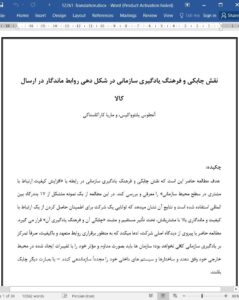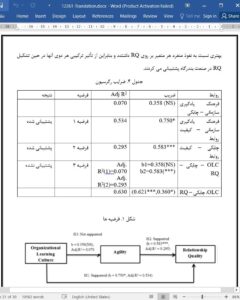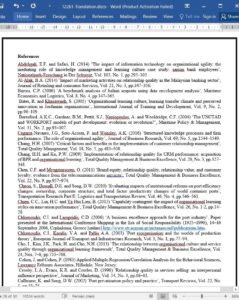Abstract
The current study aims to introduce and examine the role of agility and organisational learning culture towards enhancing customer relationship quality at the corporate environment level. Using a sample of 17 ports internationally, the study results revealed that the ability of a firm to ensure a long-lasting quality relationship with its customers is directly and positively influenced by its agility and its learning culture. Following the organic view of the firm, this study advocates that, in order to establish strong and committed quality relationships, focusing solely on organisational learning is not enough; organisations should constantly and effectively adapt to changes in their external environment and reorganise their internal structures and systems or in other words be agile.
1 Introduction
The current business environment is characterised by high unpredictability and fast – changing customer demands. For any service company, the success of effectively reorganising daily procedures and practices relies to a great extent on the quality of the human capital, employees’ thoughts and behaviour, as well as on the dissemination of a learning culture inside the firm. In this vein, an organisational learning culture (OLC) creates an appropriate internal organisational environment, in which employees advance their knowledge and skills and become thus capable of contributing towards the development of systems and processes that are required for successful agility. Since the concept of agility among other things promotes flexibility and rapid response to customer demands (Marlow and Paixão, 2003; Ugboma et al., 2007), the joint deployment of a learning culture and agility implies quick and effective service performance as well as the development and maintenance of relationship quality (RQ) with the customers (Nguyen and Nguyen, 2010; Zhang et al., 2004).
6 Conclusions and managerial implications
The concept of agility as a possible key competitive differentiator for port industry has already been acknowledged (Paixão and Marlow, 2003) in the relevant literature, highlighting the importance of effective and reactive responses and adaptations to external environmental changes. However, previous studies either adopted a purely theoretical approach when examining agility issues in the port environment (Paixão and Marlow, 2003) or provided conclusions drawn from a single port authority (Pantouvakis and Bouranta, 2017). Therefore, this study aimed to extend the knowledge on the interrelationships among OLC, agility and RQ by using evidence from the international port industry.










